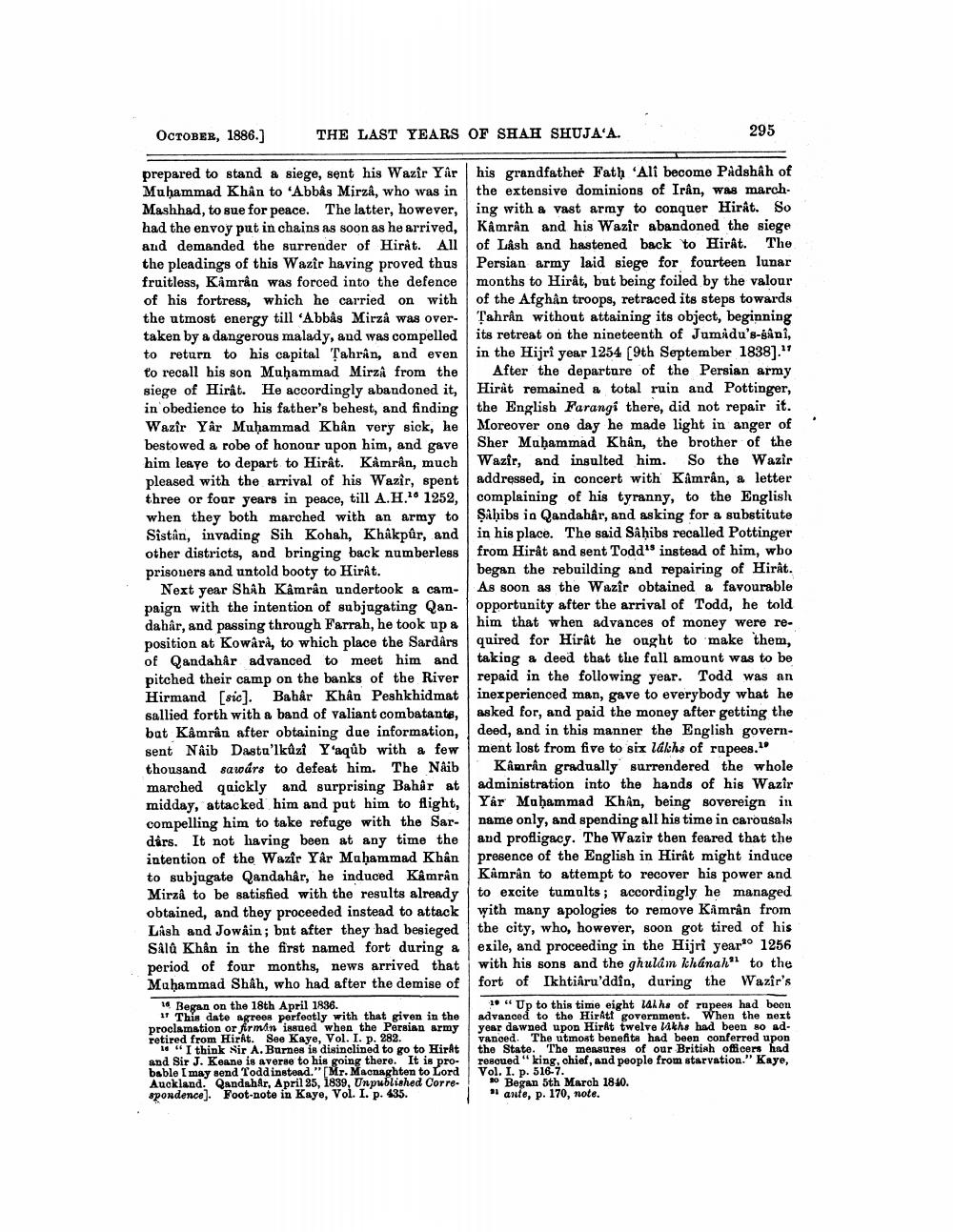________________
THE LAST YEARS OF SHAH SHUJAA.
OCTOBER, 1886.]
prepared to stand a siege, sent his Wazir Yâr Muhammad Khân to 'Abbas Mirza, who was in Mashhad, to sue for peace. The latter, however, had the envoy put in chains as soon as he arrived, and demanded the surrender of Hiràt. All the pleadings of this Wazir having proved thus fruitless, Kamran was forced into the defence of his fortress, which he carried on with the utmost energy till 'Abbas Mirza was overtaken by a dangerous malady, and was compelled to return to his capital Tahrân, and even to recall his son Muhammad Mirza from the siege of Hirât. He accordingly abandoned it, in obedience to his father's behest, and finding Wazir Yâr Muḥammad Khân very sick, he bestowed a robe of honour upon him, and gave him leave to depart to Hirât. Kâmrân, much pleased with the arrival of his Wazir, spent three or four years in peace, till A.H.10 1252, when they both marched with an army to Sistân, invading Sih Kohah, Khâkpûr, and other districts, and bringing back numberless prisoners and untold booty to Hirât.
Next year Shah Kâmrån undertook a campaign with the intention of subjugating Qandahar, and passing through Farrah, he took up a position at Kowârà, to which place the Sardars of Qandahår advanced to meet him and pitched their camp on the banks of the River Hirmand [sic]. Bahar Khân Peshkhidmat sallied forth with a band of valiant combatants, bat Kâmrân after obtaining due information, sent Naib Dastu'lkûzî Y'aqub with a few thousand sawárs to defeat him. The Naib marched quickly and surprising Bahâr at midday, attacked him and put him to flight, compelling him to take refuge with the Sardars. It not having been at any time the intention of the Wazir Yâr Muhammad Khân to subjugate Qandahår, he induced Kâmrân Mirza to be satisfied with the results already obtained, and they proceeded instead to attack Lash and Jowain; but after they had besieged Salû Khân in the first named fort during a period of four months, news arrived that Muhammad Shah, who had after the demise of
16 Began on the 18th April 1836.
This date agrees perfectly with that given in the proclamation or firman issued when the Persian army retired from Hirkt. See Kaye, Vol. I. p. 282.
I think Sir A. Burnes is disinclined to go to Hirat and Sir J. Keane is averse to his going there. It is probable I may send Todd instead." [Mr. Macnaghten to Lord Auckland. Qandahar, April 25, 1839, Unpublished Correspondence]. Foot-note in Kaye, Vol. I. p. 435.
295
his grandfather Fath 'Ali become Padshah of the extensive dominions of Irân, was marching with a vast army to conquer Hirât. So Kâmrån and his Wazir abandoned the siege of Låsh and hastened back to Hirât. The Persian army laid siege for fourteen lunar months to Hirât, but being foiled by the valour of the Afghân troops, retraced its steps towards Tahran without attaining its object, beginning its retreat on the nineteenth of Jumidu's-sânî, in the Hijri year 1254 [9th September 1838]."'
After the departure of the Persian army Hirat remained a total ruin and Pottinger, the English Farangi there, did not repair it. Moreover one day he made light in anger of Sher Muḥammad Khân, the brother of the Wazir, and insulted him. So the Wazir addressed, in concert with Kâmrân, a letter complaining of his tyranny, to the English Sahibs in Qandahar, and asking for a substitute in his place. The said Sahibs recalled Pottinger from Hirât and sent Todd's instead of him, who began the rebuilding and repairing of Hirât. As soon as the Wazîr obtained a favourable opportunity after the arrival of Todd, he told him that when advances of money were required for Hirât he ought to make them, taking a deed that the full amount was to be repaid in the following year. Todd was an inexperienced man, gave to everybody what he asked for, and paid the money after getting the deed, and in this manner the English government lost from five to six lakhs of rupees.1o
Kamran gradually surrendered the whole administration into the hands of his Wazir Yâr Muhammad Khân, being sovereign in name only, and spending all his time in carousals and profligacy. The Wazir then feared that the presence of the English in Hirât might induce Kâmrân to attempt to recover his power and to excite tumults; accordingly he managed with many apologies to remove Kamrân from the city, who, however, soon got tired of his exile, and proceeding in the Hijri year 1256 with his sons and the ghulâm khánah" to the fort of Ikhtiaru'ddîn, during the Wazir's
Up to this time eight lakhs of rupees had been advanced to the Hirkti government. When the next year dawned upon Hirit twelve lakhs had been so advanced. The utmost benefits had been conferred upon the State. The measures of our British officers had rescued "king, chief, and people from starvation." Kaye, Vol. I. p. 516-7.
20 Began 5th March 1840. "ante, p. 170, note.




